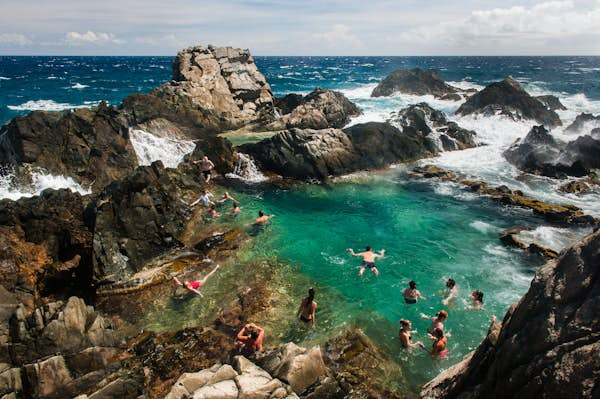Arikok National Park brings a taste of desert life to the popular Dutch–Caribbean island nation of Aruba.
From off-road 4WD tours through the park’s rugged terrain to swimming in natural pools or standing on a bridge formed by eroded limestone, Arikok provides loads of great things to do for the entire family. Here’s everything you need to know for a seamless visit to Aruba’s desert park.
The history of Arikok National Park
Located on the northeastern side of the country, Arikok National Park was officially deemed a protected area in 2000, although the terrain was formed and inhabited well before that — as evidenced by cave drawings and markings that are still visible today. The more than 7900 acres of natural area now encompasses about 20% of the island.
The park’s name was inspired by its second-tallest hill — Arikok — sitting at 185m (606ft). Much of the park was naturally formed by volcanic activity, eroding limestone and the effects of high winds and rough waves.

How to get to Arikok National Park
From the hotel zone of Aruba (the “noord” part of the island where most of the hotels are located), the drive south to Arikok takes just under 40 minutes.
You will need to rent your own vehicle, book a guided tour or take a taxi to reach the entrance. If you choose to rent your own vehicle, get a 4WD to better navigate the rocky tracks and terrain. The island’s public buses do not travel to Arikok and ATVs, UTVs and motorbikes are prohibited within the park’s grounds.
There are two entrances into the park, San Fuego — the easiest entrance to reach and where the visitor center is located — and Vader Piet, located on the southeastern border of the park.
There’s a conservation fee of USD$11 for adults (children aged 17 and under are free) that goes toward the preservation and maintenance of the park. The park is open from 8am until 4pm daily.

Most popular tours to Arikok National Park
For those who prefer to let someone else do all the leg work, book a guided tour for your Arikok National Park visit. DePalm Tours is the island’s main tour operator — although certainly not the only one — offering a range of day tours and experiences within the park.
The company’s half-day open-air 4WD tour is the most popular, which picks up from most of the island’s hotels. The tour starts with an off-road safari through the park.
If you’re susceptible to motion sickness, this may not be the tour for you. Guides will take you to park’s natural pool for a dip and photo ops. There’s a short hike — including steep, narrow stairs — required to reach the pool.
After the dip, you’ll take a less bumpy ride to see some of the park’s other attractions, like the Alto Vista Chapel — surrounded by massive cacti — the California lighthouse and the famed natural bridge.
Horseback riding tours and hiking trails are also available through the park. Hikes range from beginner to strenuous, and you can opt for a guided hike with a park ranger. For self-guided hikes, trail info can also be found at the visitor’s center at the San Fuego entrance.
If you opt to rent a vehicle, don’t worry, it’s still easy to navigate the park. Pick up maps at the visitor center. It’s best to arrive as early as possible to avoid tour crowds. For those arriving by cruise ship, you’ll need to arrange tours through the cruise line.

The best things to see in Arikok National Park
Visiting the park’s caves provides a closer look into the lives of the area’s early inhabitants. There are two caves open to the public daily from 8am until 4pm – Fontein and Quadirikiri. There’s a park ranger at the opening of each cave to give tours, and explain the meaning of the drawings left by the island’s Arawak Indians.
Depending on the time of year that you visit, you may catch a glimpse of leatherback and green sea turtles nesting at Dos Playa within the park. The unspoiled beach has two coves and is popular for surfing. The waters are very rough and not recommended for people looking to swim or body board.
If you plan to spend the day at Dos Playa, you won’t be far from the dunes of Boca Prins — created by the ongoing northeastern trade winds.
